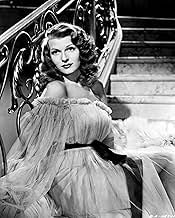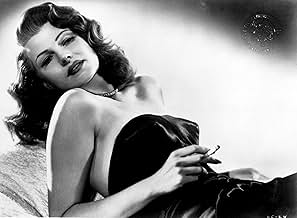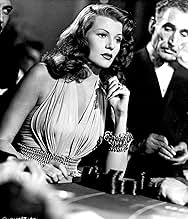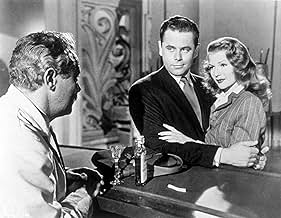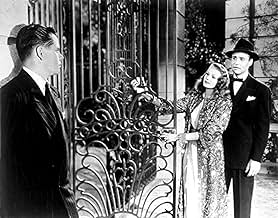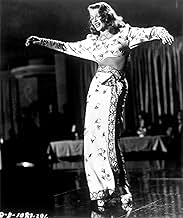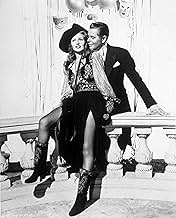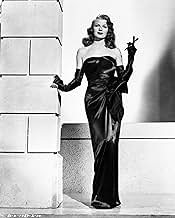PUNTUACIÓN EN IMDb
7,6/10
37 mil
TU PUNTUACIÓN
Un jugador de poca monta contratado para trabajar en un casino de Buenos Aires descubre que la nueva esposa de su jefe es su antigua amante.Un jugador de poca monta contratado para trabajar en un casino de Buenos Aires descubre que la nueva esposa de su jefe es su antigua amante.Un jugador de poca monta contratado para trabajar en un casino de Buenos Aires descubre que la nueva esposa de su jefe es su antigua amante.
- Premios
- 1 premio y 1 nominación en total
Mark Roberts
- Gabe Evans
- (as Robert Scott)
Donald Douglas
- Thomas Langford
- (as Don Douglas)
Julio Abadía
- Newsman
- (sin acreditar)
- …
Enrique Acosta
- Gambler
- (sin acreditar)
Ed Agresti
- Nightclub Patron
- (sin acreditar)
Sam Appel
- Blackjack Dealer
- (sin acreditar)
Nina Bara
- Girl at Carnival
- (sin acreditar)
Edward Biby
- Gambler
- (sin acreditar)
Robert Board
- American Cartel Member
- (sin acreditar)
Argumento
¿Sabías que...?
- CuriosidadesThere is a rumour that this film is the only time Rita Hayworth's real singing voice is heard, but that is not true. According to the bonus features from the DVD, Hayworth actually never recorded her own singing voice and was a talented lip-syncher. Anita Ellis dubbed almost all of her singing in this film. Hayworth always wanted to do her own singing, and Columbia Pictures chief Harry Cohn paid for her voice lessons, but she never developed a voice he considered strong enough to be used; Hayworth remained bitter about that for the rest of her life.
- PifiasWhen Farrell asks to cut the deck at the blackjack table, he shuffles the deck prior to the cut; this is not allowed.
- Citas
Gilda: You do hate me, don't you, Johnny?
Johnny Farrell: I don't think you have any idea of how much.
Gilda: Hate is a very exciting emotion. Haven't you noticed? Very exciting. I hate you too, Johnny. I hate you so much I think I'm going to die from it. Darling...
[they kiss passionately]
Gilda: I think I'm going to die from it.
- ConexionesEdited into Head (1968)
Reseña destacada
George Macready is playing the role that most people remember him for - Balin Munson, nightclub millionaire in Argentina, and a man with pure ice in his veins. He has two friends...Johnny (Glenn Ford), who Balin rescues from some toughs, and a slick, sharp little chum hidden in his walking stick - ever ready to cut up people that Balin doesn't like. He also has bigger plans. Men like Balin are not satisfied with successful nightclub/gambling casinos (however successfully they are run). During the Second World War several German and axis industrialists found Balin a comfortable man to do business with. It seems they were not sure if Der Fuhrer would win after all, so they transferred various papers concerning their international holdings in tungsten manufacturing to Balin for him to watch. Big mistake, for Balin realizes that the documents actually put these interests into his fully capable hands. And since he has managed to bribe a local tungsten manufacturer to sell out his plant in Argentina, if Balin can leave without police interference he can put together a cartel that will control the manufacture of such things as light bulb filaments. Sounds preposterous, but that is Balin's goal. He only has two problems: Johnny and Balin's beautiful wife Gilda (Rita Hayworth) apparently know each other and can't stand each other - but he has to leave them in charge of his nightclub while he's away. The other problem is Detective Maurice Obregon (Joseph Calleia) of the Argentine Police Department. Obregon suspects Balin's involvement in this illegal cartel scheme, and is watching him like a hawk.
"Gilda" is the film that made Rita Hayworth a star, and (with "Paths of Glory") gave Macready his justifiable claims to being one of Hollywood's best villains. Ironically many people don't think of Macready as anything but a villain in movies. It is true that in films like "Lady Without a Passport" and "The Big Clock" he was a villain, but he also could play decent people. He tries to help Spencer Tracy escape recapture and execution in "The Seventh Cross", and he is the wise minister and reformer who helps thwart Ray Milland (a.k.a. the Devil) in "Alias Nick Beal". But his Balin is pure, malevolent ice. There has been some suggestion that Balin's relationship with Johnny is actually a homosexual one (the business with the knife in the cane possibly being a metaphor for a male sex organ). Perhaps, but it is a weird friendship of two cynics who (briefly) enjoy each other's cynicism.
Curiously enough the business of the tungsten cartel is rarely discussed in going over the film. Like "Notorious" which came out about the same time, "Gilda" reminded American audiences of the large numbers of Nazis and collaborators who fled to South America in this period. In "Notorious" it was Brazil, and the gang (led by Alex Sebastian - Claude Rains) was fooling around with uranium. Here the idea of such people controlling a useful metal's manufacturing was not probed as much, probably because Balin was set to double cross them. But it is worrying to think of them coming so close to it.
In a discussion of the Warner Baxter film, "Such Men Are Dangerous" I mentioned that (like that film) there is a hint here of the 1928 mysterious death of millionaire Alfred Loewenstein, who managed to fall out of his private airplane over the English Channel. Here, to evade both the Nazis and Calleia, Balin arranges his plane to explode over the ocean (although the audience and Calleia see a figure parachute before it does so). Not quite the same problem as the Loewenstein mystery, but one can see the seed of the idea was there.
I would say this was certainly one of the better film noirs. It even was somewhat thought provoking.
"Gilda" is the film that made Rita Hayworth a star, and (with "Paths of Glory") gave Macready his justifiable claims to being one of Hollywood's best villains. Ironically many people don't think of Macready as anything but a villain in movies. It is true that in films like "Lady Without a Passport" and "The Big Clock" he was a villain, but he also could play decent people. He tries to help Spencer Tracy escape recapture and execution in "The Seventh Cross", and he is the wise minister and reformer who helps thwart Ray Milland (a.k.a. the Devil) in "Alias Nick Beal". But his Balin is pure, malevolent ice. There has been some suggestion that Balin's relationship with Johnny is actually a homosexual one (the business with the knife in the cane possibly being a metaphor for a male sex organ). Perhaps, but it is a weird friendship of two cynics who (briefly) enjoy each other's cynicism.
Curiously enough the business of the tungsten cartel is rarely discussed in going over the film. Like "Notorious" which came out about the same time, "Gilda" reminded American audiences of the large numbers of Nazis and collaborators who fled to South America in this period. In "Notorious" it was Brazil, and the gang (led by Alex Sebastian - Claude Rains) was fooling around with uranium. Here the idea of such people controlling a useful metal's manufacturing was not probed as much, probably because Balin was set to double cross them. But it is worrying to think of them coming so close to it.
In a discussion of the Warner Baxter film, "Such Men Are Dangerous" I mentioned that (like that film) there is a hint here of the 1928 mysterious death of millionaire Alfred Loewenstein, who managed to fall out of his private airplane over the English Channel. Here, to evade both the Nazis and Calleia, Balin arranges his plane to explode over the ocean (although the audience and Calleia see a figure parachute before it does so). Not quite the same problem as the Loewenstein mystery, but one can see the seed of the idea was there.
I would say this was certainly one of the better film noirs. It even was somewhat thought provoking.
- theowinthrop
- 15 mar 2005
- Enlace permanente
Selecciones populares
Inicia sesión para calificar y añadir a tu lista para recibir recomendaciones personalizadas
- How long is Gilda?Con tecnología de Alexa
Detalles
Taquilla
- Recaudación en todo el mundo
- 5999 US$
- Duración1 hora 50 minutos
- Color
- Relación de aspecto
- 1.37 : 1
Contribuir a esta página
Sugerir un cambio o añadir el contenido que falta



